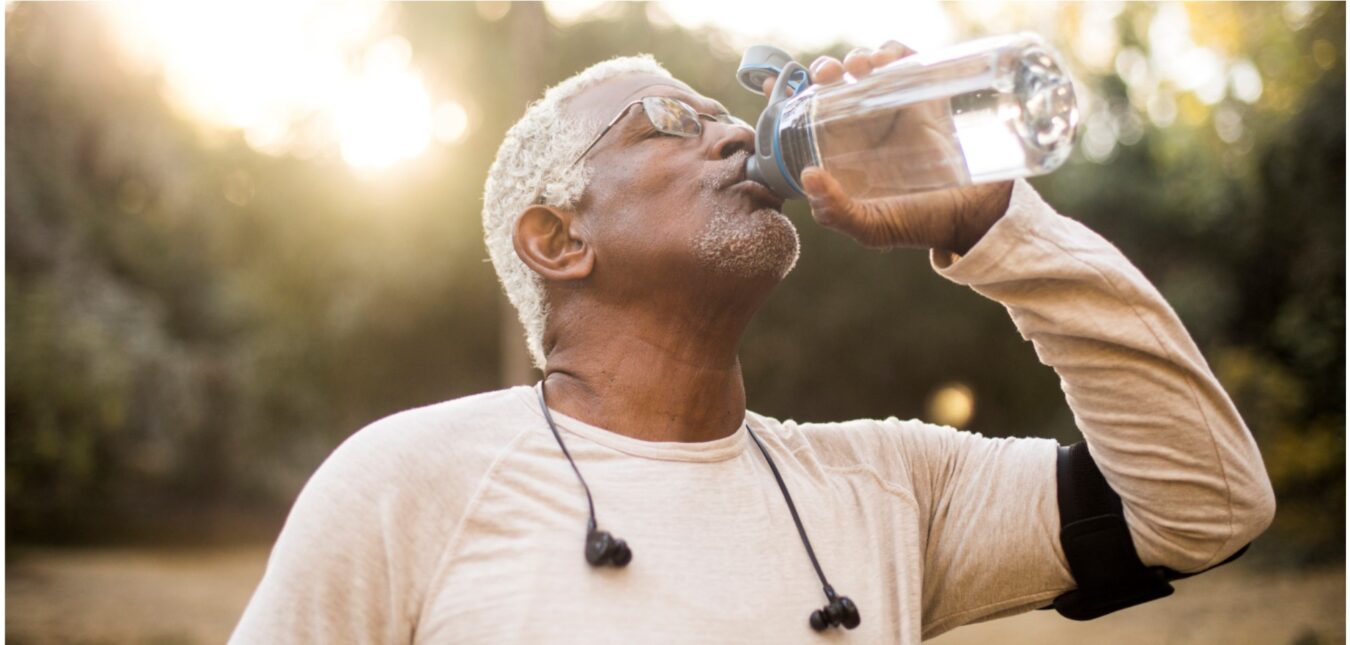Fight Inflammation by Staying Hydrated
by Leslie LaPlace, Goodwin House Alexandria Fitness Manager
The dog days of summer are certainly upon us. As we enjoy the long, hot days let’s not forget that water is meant for more than the pool or the sprinkler. Our bodies are 60 percent water and every one of our organs needs water in order to function properly.
Older adults often don’t get enough fluids and risk becoming dehydrated, especially during summer when it’s hotter and we perspire more. As we age, we face greater challenges in maintaining hydration levels. Why? Because our sensitivity to thirst declines and aging cells retain less water.
Dehydration could especially be a problem if we’re on a medication that may cause fluid loss, such as a diuretic (e.g., corticosteroids or metformin), or other drugs that impact thirst sensation. Warning signs of dehydration include weakness, low blood pressure, dizziness, confusion or urine that’s dark in color.
Hydration Fights Inflammation
Hydration helps our bodies fight inflammation by flushing out toxins. Adequate water intake can also help keep our joints well lubricated and prevent gout attacks. Most of the water in our bodies is stored in connective tissue (tendons, ligaments, etc.) and joints, where water acts as a lubricant and helps clear out toxins. When we get dehydrated, our bodies look for water in other areas, including our joints, and redistribute it where it’s needed. Taking water from your joints enables toxins to remain, which fuels pain and inflammation.
How Much Water to Consume
To ward off dehydration, healthy people should get 30 to 50 ounces of water per day (about 1 to 1.5 liters), but not all at once. According to Dr. Julian Seifter, a kidney specialist and associate professor of medicine at Harvard Medical School, “the kidneys lose some ability to eliminate water as we age. It’s important to stay hydrated gradually, throughout the day.”
Dr. Seifter recommends drinking water or juices (just a limited amount of juices due to high sugar content) and eating water-rich foods such as salads, fruit, and applesauce. “An easy way to stay hydrated gradually is by getting fluids through meals, with medicine and socially,” he says.
The Mayo Clinic suggests drinking a cup of water or other low-calorie beverage with each meal and between each meal, and also before and after exercise. Some evidence indicates that drinking water between 50-69°F is best for hydration. Keeping your favorite cup, mug, or water bottle on hand at all times may help encourage you to drink gradually throughout the day.
Particularly given that water fountains and hydration stations are unavailable right now, due to the pandemic, carrying a water bottle with you is a great way to keep hydrated. Even better is getting a reusable water bottle, so you can cut down on the amount of plastic being used. Not only are you able to stay hydrated, but you’re also being kind to the environment!
Although uncommon, it’s possible to take in too much water if you have certain health conditions, such as thyroid disease or kidney, liver or heart problems, or if you’re taking medications that make you retain water, such as nonsteroidal anti-inflammatory drugs (NSAIDs), opiate pain medications and some antidepressants. For that reason, Dr. Seifter says you should check with your primary care physician to be sure you’re getting the right amount.
However you’re spending your summer days, don’t forget to drink water!
_________________________________
Leslie LaPlace is self described recovering Software Development Project Manager. Leslie parlayed a lifelong love of and belief in the restorative power of exercise into a satisfying career working with adults ages 55 and older. She believes that staying active can help reduce aches and pains—It’s also a great anti-aging remedy. She has more than six years’ experience working with seniors at Arlington County, The Jefferson, GHBC and GHA. Leslie is a certified personal trainer and aquatic instructor who loves creating a positive and fun training experience. She believes that it’s never too late to improve your strength and balance!





